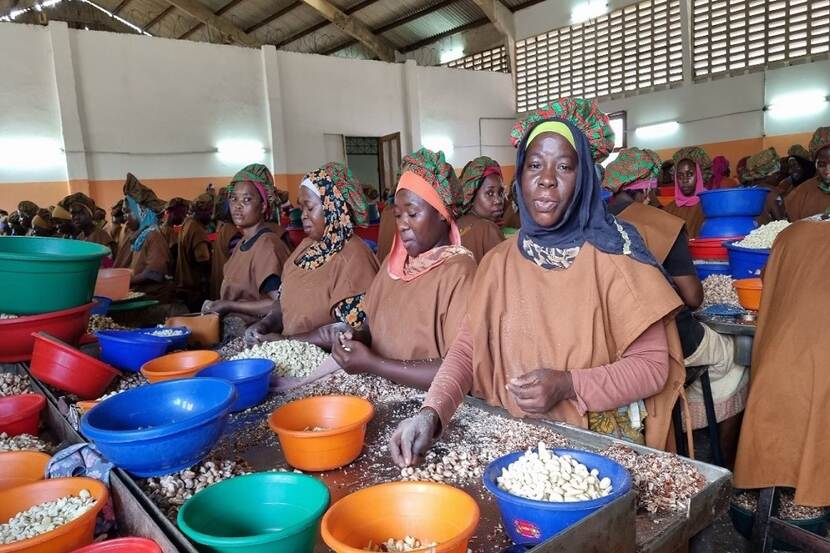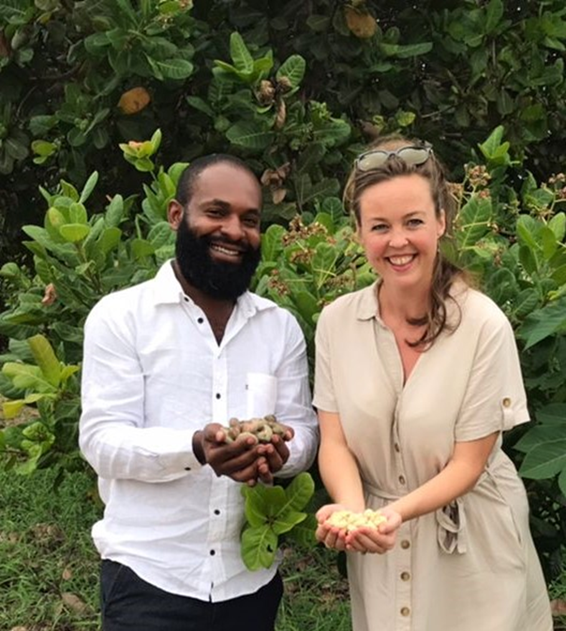Growth potential for domestic processing of Tanzanian cashews
Tanzania is well known for its cashew nut production. The nuts are nicknamed “grey gold” due to the high return on investment. However, only 5% of the raw cashew nuts are being processed locally. The other 95% travel all the way to Vietnam or India for value addition before reaching consumer markets of Europe and America. It is estimated that this created a loss of around Tanzania Shillings 216 billion (equivalent to 83 million EUR) in the season of 2020-2021 (The Citizen 20th of February 2022) for Tanzania.

Historically, the Southern region of Tanzania is well known for cashew crop cultivation. The region has small-scale processors of Cashew, however none of them are Fairtrade registered. With growing demand of Fairtrade products around the world; where social, economic and environmental aspects of crop production are considered for producers and traders; being a Fairtrade certified farmer comes with a lot of benefits.
First East-African Fairtrade certified cashew nut processor
Since October last year (2021), Mtwara is home to the first East-African Fairtrade certified cashew nut processing company. Mama Cashew, the brand name of trading company Listram Commodities Co. Ltd., owned by the business-and life-partners George Hokororo (TZ) and Maria Verschoof (NL) started off cashew nut sourcing, processing, and exporting operations. The company works with 425 farmers and employing 530 factory workers.

Current state of affairs
In Tanzania, Cashew nuts are gaining more and more popularity. Cashew nuts are one of the four traditional cash crops after coffee, tea, and cotton. Several efforts are being made to increase cashew production and local cashew processing. The peeling process of the cashew nuts is done in Tanzania while value addition is done in Asia. The Tanzania government aims to increase raw cashew production from 30,000Mt to 700,000Mt by the year 2025. This means, a lot of cashews will be available for processing, potentially domestically, in the coming years.
Challenges
Farmers access to financial and sustainable markets are hampering and withholding development (as well behind the scenes; manipulation of raw cashew nut prices). Up until last season, local processors were forced to compete on the auction with traders from all over the world. This changed with the implementation of the Cashew Act (August 2021), which allows local processors to buy raw cashew direct from the farmers. Mama Cashew considers the implementation of the Cashew Act as an excellent opportunity to improve cashew nut processing for the benefit of the local Tanzanians.
The real game-changer is the by Fairtrade developed Living Income Reference Price
Future perspectives
As the first, and currently only, Fairtrade Certified cashew nut processor in Tanzania and East Africa, Mama Cashew is convinced that ethically buying and processing is the only way forward to create a sustainable impact in the cashew nut sector. With the Fairtrade Certification farmers are guaranteed a minimum price and are receiving a premium to be used for improving the production capacity. The real game-changer is the by Fairtrade developed Living Income Reference Price, which defines a sufficient price to afford a decent standard of living for all household members, including a nutritious diet, clean water, proper housing, education, health care, emergency money, this when the farm costs are covered. The current scheme allows the farmers only to survive from season to season.

Pricing
Different from the auction, whereby the prices do fluctuate throughout the season, Mama Cashew uses a contract farming model. Along with the contract, Mama Cashew is providing Fairtrade-approved inputs on credit to farmers. Owners George Hokororo and Maria Verschoof believe that it is important to invest in the farmers they work with. So their supply does not only become more reliable, but they also have opportunities to grow. “It is a clear win-win”.
Turning waste into profit
Only 30% of cashew nuts are fit for processing. The remaining 70% is waste that can be used for recycling. However, the practise at the moment in Tanzania is that waste is thrown away, explains Maria Verschoof. This offers various opportunities for us to look into bio products resulted from cashew waste such as animal feed, oil, fuel etc.
Where in Europe a change of consumption towards healthy and sustainable foods is happening, Mama Cashew aims the same for the cashew sector of Tanzania: healthy and sustainable cashew nuts for all stakeholders involved.
For more information about Mama Cashew please email Maria Verschoof jm.verschoof@gmail.com. For any questions for the agricultural department, feel free to contact us via dar-lnv@minbuza.nl. For the latest updates on activities, new articles and more follow us on twitter via @NLAgiTanzania and you can subscribe to our newsletter by sending us an email.